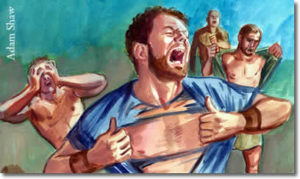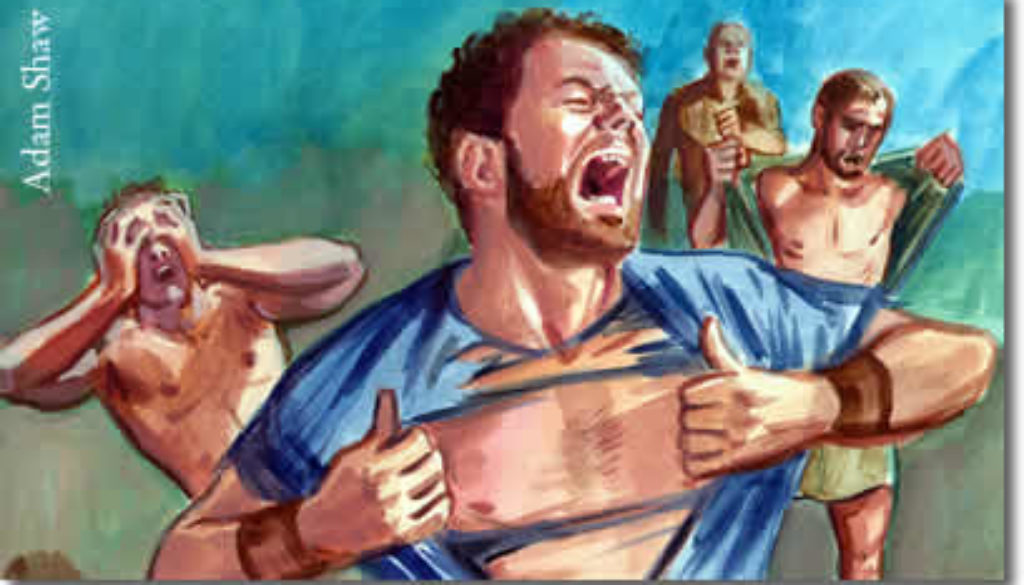2 Samuel 1:1-16 David Mourns

Second Samuel opens with the death of Saul. So began David’s reign as king. But he did not applaud Saul’s death. He tore his clothes and cried out instead.
First I want to say I’m glad to be back in the word. I enjoyed the break with advent and epiphany but I missed our bible time together.
The story brought to David is NOT the same story that was carried to us. When we ended in 1 Samuel 31 we have the story of Saul and his son’s deaths. There are a few similarities in the stories.
- Israel was in battle with the Philistines
- Israel was retreating or fallen
- Saul asked someone to take his life because he was wounded
- Saul died.
That’s where the stories agree. The differences are glaring and telling of the man who delivered the news to David. I would lay odds on the man expecting some kind of reward for his actions. He probably thought that embellishing the story with him in it would raise him in David’s eyes. Mind you, he made certain to play ‘his actions’ as a sign of respect and honor to Saul. He also showed ‘respect’ to the dead by tearing his clothes and putting dirt on his head before approaching David.
Let’s pick up our story where we left off with David. He and his men had been sent home from the battle field only to find their homes burned to the ground and everyone and everything carried off. They set off in pursuit and were led to the Amalekite group who had been raiding quite a bit in their absence. After FIERCE fighting, David’s partial group defeated the Amalekites and rescued every one of his people unharmed. On the way home with the spoils of war, David’s two groups reunite and return as one to Ziklag. This is where we take up our story.
♥ ♦ ♥
David had originally planned for his men to set out and join Saul’s forces right after arriving at Ziklag from the battlefield, but that was days ago. They had gone into another battle instead and were all weary.
David aches to know the status of the battle between the Philistines and Saul’s forces. But his first duty is to those who follow him. Their safety rests on his shoulders. This was never more evident to him than the moment he and his men discovered their absence. With their liberation it is time to turn to rebuilding their homes and ensuring their safety.
Part one of this process was sending gifts to those who had supported them in the past. David intends these gifts as a reminder of his loyalty to them and an enticement for their protection in kind, should the need arise again. Part two is restoring order and a feeling of security to his own people.
David, Abigail, and Ahinoam walk side by side as they near the place they called home for the last year. This place holds both bitter and sweet memories. With the toe of his sandal, David gently kicks a pile of rubble. It shifts to reveal a smashed jar. One of Abigail’s favorites for fetching water. Ahinoam squeezes her hand in mutual support.
“There is nothing to do but to start anew. We have done that often enough.”
“True my husband” replies Abigail. She straightens her shoulders and raises her chin defiantly towards the wreckage before her.
They begin sifting through the debris, hoping to find something salvageable. David isn’t worried about the broken pieces. The spoil they brought back has plenty to replace what was lost.
Much progress is made in clearing away the remains by night fall. The whole camp gathers under the trees for evening meal.
“Where will we sleep Ima” a young child asks.
“Under the stars tonight my son” replies his father who walks in on their conversation. He hands his wife a blanket and she wraps it across her shoulders.
“Come here Kaleb” she calls softly. He comes to her and she places him in her lap and wraps the blanket around both of them. He husband wraps them both in his strong arms and covers them with a goatskin covering. He leans against a tree sheltering his family.
The spoils gathered from the battle with the Amalekites did not contain undamaged tents but the materials used in their construction provides enough coverings to keep David’s group warm through the night. Sentries are stationed to ensure physical and emotional safety.
Morning brings sounds of construction. Trees are being felled and stripped for branches to weave into coverings for roofs and mats. Those same trees are being split and fashioned to provide structure for the new dwellings. Stones from the original homes are being refitted around the new supports. Work is slow but steady. Two days of construction later and the homes are taking shape. The people should be able to shelter in their homes this night.
About mid-morning an alert call is heard from one of the watchmen. This sound signifies travelers approaching. David grabs his sword and heads towards the sound of his watchman. He is joined by his generals who are likewise armed. A lone figure walks between two watchman. His clothes are torn and his head is covered with dirt, not as in dirty, but as in mourning. As the three approach, the visitor falls to the ground before David to honor him.
David remains watchful as he questions the man. “Where do you come from?” (verse 3a).
“I have escaped from the camp of Israel” (verse 3b).
David’s eyes light up at hearing this. “How did it go? Tell me” (verse 4a) he demands.
The man hangs his head in shame. “The people fled from the battle, and also many of the people have fallen and are dead, and Saul and his son Jonathan are dead” (verse 4b).
“How do you know that Saul and his son Jonathan are dead?” (verse 5b).
The man raises his head just short of looking David in the eye. “By chance I happened to be on Mount Gilboa, and there was Saul leaning on his speak, and behold, the chariots and the horsemen were close upon him. And when he looked behind him, he saw me, and called to me. And I answered, ‘Here I am.’ And he said to me, ‘Who are you?’ I answered him, ‘I am an Amalekite.’ And he said to me, ‘Stand beside me and kill me, for anguish has seized me, and yet my life still lingers.’ So I stood beside him and killed him, because I was sure that he could not live after he had fallen. And I took the crown that was on his head and the armlet that was on his arm, and I have brought them her to my lord” (verses 6-10). As he was speaking, the man removed a bag from over his shoulder. He now opened it and held out the items of Saul’s royalty to David.
David recoiled from the man as if the man had struck him. With a great cry, he took hold of his own clothes and tore them. “My king! My king” he cried. David’s generals did likewise.
The man was shocked at David’s initial reaction. He knows of Saul’s hunt for David. He decides it is wise to keep silent for now.
The sound of their mourning stopped the rest of the camp in its tracks. Those who hadn’t joined them initially did so now. Within moments the entire camp was filled with the sounds of mourning. The people knew David’s heart. They knew of his love for Jonathan, the king’s son.
They also knew David was loyal to Saul, in spite of Saul’s determination to end David’s life. On two occasions David had opportunities to end his own flight by taking Saul’s life, but he stayed his hand and forbade any other to harm even a hair of Saul’s head.
David and all his people “mourned and wept and fasted until evening for Saul and for Jonathan his son and for the people of the Lord and for the house of Israel, because they had fallen by the sword” (verse 12). Even the people who were secretly glad to hear of Saul’s death were deeply distressed by Israel’s defeat in battle. Israel was just beginning to crawl out from under the Philistine oppression and now they had lost a major battle against ALL the kings of Philistia.
When the sun finally set on this long day of mourning David asked that the man be brought to him. He had issues with this man that needed addressed. The man had faded into the background of people as the day wore on.
Joab approached the man. “David wishes to see you.”
“It is about time” he thinks in his heart. To Joab, he bows and quickly follows him to where David waits.
David speaks as the man approaches. “Where do you come from?” (verse 13b).
“I am the son of a sojourner, an Amalekite” (verse 13c) he replies.
With an edge of steel to his voice, David poses his next question. “How is it you were not afraid to put out your hand to destroy the Lord’s anointed?” (verse 14).
The man is shocked by David’s question. When Joab told him David wanted to see him, he expected he was going to receive a reward for his service to the king or at least for bringing the news of Saul’s death to David’s ears. But David’s words strike fear in his heart. He has no answer to give.
David called out to one of his young men. “Go, execute him” (verse 15b).
The Amalekite messenger eyes grew large but he did not resist being led away. He knows that David’s word is law within this camp. If he were to break free of the young man charged with killing him, he wouldn’t make it ten steps before another of David’s men took up the task. And why shouldn’t they. His own words had condemned him. EVERYONE knew that Saul had been anointed by Samuel under God’s direction. He was God’s anointed, just as David had said. If he changed his story to say that he came upon Saul AFTER he had died, his whole story and character would be called into question. He was dead either way.
The young man tasked with carrying out sentence struck him with his sword. His death was not instantaneous but his suffering would be short. Before he closed his eyes the final time he saw David standing over him. There was finality in his voice as he spoke. “Your blood be on your head, for your own mouth has testified against you, saying, ‘I have killed the Lord’s anointed’” (verse 16).
David turned and walked away, leaving the man lying on the ground. His last breath taken for perpetuating a lie.
(to be continued)
Part of his story was true. He had to have come upon Saul’s body before the Philistines reached him and hung him on the wall. I doubt the Philistines would have turned Saul’s crown and armlet over to him to bring to David. Is it even remotely possible that he came to Saul before he died? I don’t see how as our text only tells of Saul asking his armor bearer to kill him. The armor bearer refused to offer his king that service. And he killed himself when he saw that Saul was indeed dead.
Father God, You plan for EVERYTHING. You even made a way for David to discover Saul’s death from a personal witness. You had the symbols of power brought to him. You opened the door for David to step into his role as king. He didn’t need to do anything to make this happen.
I can trust Your plans for my life just as clearly. You don’t need my ‘help’ getting things done. When I put my trust in You, I can be certain You know the BEST way forward for me. Keep me listening to YOUR directions. No matter where the path takes me; when we walk together the journey is always worth it.



